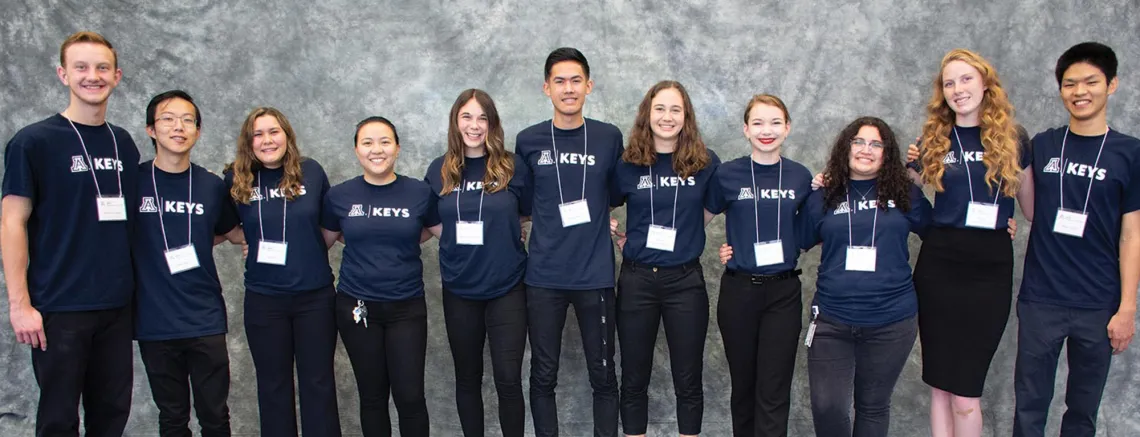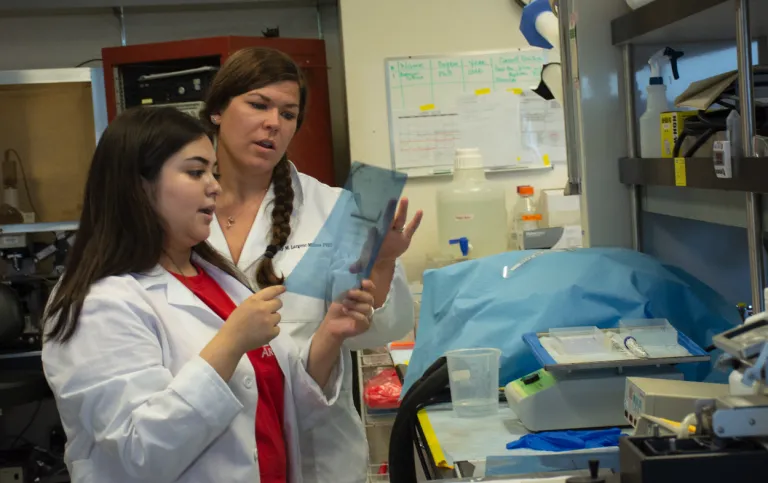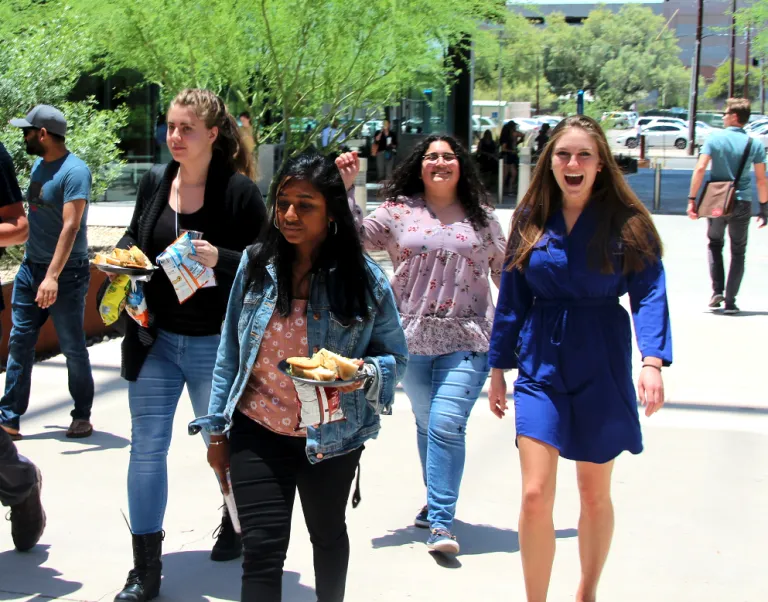Near-Peer Mentors are Critical Components to KEYS Success
KEYS Crew undergraduate students personally and professionally mentor the program’s high school interns during the rigorous summer research internship.

KEYS Crew is composed of former interns who use lessons from their experiences to mentor the current class of KEYS students.
The BIO5 Institute’s Keep Engaging Youth in Science (KEYS) research internship is a competitive seven-week program that immerses talented Arizona high school students in collaborative and innovative research at the University of Arizona. KEYS interns, who are often working in university research laboratories for the first time, must navigate several personal and professional challenges that are designed to prepare them for college and beyond.
Though they receive research guidance from faculty and laboratory mentors, KEYS interns benefit greatly from the guidance of former KEYS students themselves – the KEYS Crew. This year, ten former interns are sharing their wisdom with our biggest class yet.
Importance of near-peer mentorship
After reading the reflections of the inaugural 2007 KEYS class, Dr. Marti Lindsey, KEYS founder and Community Engagement Director for the Southwest Environmental Health Sciences Center at the UArizona College of Pharmacy, realized that while the bright high school students could tackle the program’s trials, they needed additional support from people they could easily identify with and who would understand their unique challenges.
To meet this need, two students from that first class joined the next cohort to provide compassionate mentorship. KEYS Crew, a group of near-peer undergraduate student mentors, had officially been born, The Crew concept continues today, and remains one of the program’s most important foundational differentiators.
“KEYS Crew enhances the ‘constellation of mentors’ approach that is embedded in the program and includes KEYS co-directors, student staff, peers, faculty and lab mentors and parents,'' said Lisa Romero, Senior Director for Public Affairs, Communications and Engagement for the BIO5 Institute. “We have found that this layered support system is essential to guiding our interns successfully through their summer journeys and beyond.”
“When the staff says KEYS is a family, they really mean that. Each intern is cared for as an individual,” said current KEYS student assistant and 2018 KEYS alumna Alexis Cruickshank-Taylor. “Crew is a group of people who truly want to help and care for others. I know how overwhelming KEYS can be at times, and it was nice having my Crew mentor as a backbone when I was struggling. Being able to be that support to this year’s interns is so rewarding.”
2021 KEYS Crew
This year’s KEYS Crew is composed of nine former interns led by one captain, all of whom are eager to support the newest class of talented Arizona high school students.
KEYS Crew Captain Robyn Pratt
Recent neuroscience and cognitive science UArizona graduate Robyn Pratt is ecstatic to spend her sixth and final summer with the KEYS program as Crew Captain.
As a high school student in 2016, Pratt interned with Dr. Michael Marty, chemistry and biochemistry assistant professor. Since Marty was a new faculty member at the time, Pratt spent much of her KEYS experience learning how to set up a research lab, learning to repair specialized equipment and witnessing the collaborative and supportive research community at UArizona.
“I was amazed by how close-knit the science community was at UA,” she said. “Many faculty members were so welcoming of Dr. Marty, so that made me feel accepted, as well. It really solidified my desire to attend UA for college.”
Though nervous when she began KEYS, Pratt’s fears were immediately quelled by the empathetic, close-knit community created by KEYS staff and Crew. In just the third week, Pratt knew she would return as a mentor.
As a Crew mentor in 2017, Pratt supported new interns and trained her fellow near-peer mentors. The following year, she was offered the position of Crew Captain – the leader of Crew – and soon after became the KEYS student assistant.
Pratt approaches her mentoring style by reflecting on her own experiences, both as a KEYS intern and as a young undergraduate student. By sharing her triumphs and struggles, Pratt validates others’ experiences and guides them on the path to success.
Now in her fourth year as captain and third year as a student assistant, Pratt is amazed by the personal and professional growth she’s experienced as part of KEYS. Not only has she enhanced her public speaking and mentoring skills, but she’s also built an immense amount of self-confidence.
“I feel so grateful KEYS was my first job,” she said. “The lessons I’ve learned are invaluable. KEYS will be with me forever, and I’ll take these skills wherever I go.”
Student Assistant Alexis Cruickshank-Taylor
In 2018, Alexis Cruickshank-Taylor studied the effects of early diabetes on the eye’s retina under the guidance of Dr. Erika Eggers, BIO5 member and associate professor of biomedical engineering, neuroscience, physiological sciences and physiology.
“Looking back, I couldn’t have asked for a more supportive lab,” she says. “They offered so much help, answered all of my questions, and really made me feel a part of the team.”
After experiencing the “unique, collective collaboration” of both the research and social aspects of the KEYS program, Cruickshank-Taylor joined KEYS the following year.
Cruickshank-Taylor is now an incoming junior at UArizona majoring in biochemistry, rejoining KEYS this summer as both a student assistant and Crew mentor. As a student assistant, she took a “behind-the-scenes” role to prepare for the current class and will begin working on 2022 recruitment following the conclusion of the 2021 program.
Student Assistant Joshua Dusek
KEYS 2018 alumnus Joshua Dusek worked with Dr. Jason Karnes, assistant professor of pharmacy practice and science, in his pharmacogenomics lab comparing small genetic differences in Hispanic/Latino populations associated with different doses of a common blood thinner.
Also a 2019 KEYS resident assistant, Dusek is now a senior at UArizona double majoring in neuroscience and psychological science. He has continued pursuing research with director of the Healthy Interpersonal Systems (HIS) Research Group, Dr. Emily Butler, studying emotional unity in romantic couples. Like Cruickshank-Taylor, Dusek is serving the dual role of student assistant and Crew mentor this summer.
Aída Alvarez
Aída Alvarez, a 2018 KEYS alumna, conducted migraine research under the guidance of Dr. Tally Largent-Milnes, BIO5 member and assistant professor of pharmacology. Alvarez measured the expression of NHE1, an ion transporter, in central nervous system cells after a migraine. Researchers may find a more precise and personalized dosing regimen for migraine patients based on her findings.
The current Crew member is now a rising junior studying neuroscience and cognitive science at UArizona. She’s continued to pursue research with Dr. Bruce Tabashnik, department head of entomology and BIO5 Regents professor, studying the eradication of the pink bollworm – an invasive species that disrupts the production of cotton in the U.S. and Mexico.
Anya Burtman
Also an intern for Dr. Largent-Milnes, 2019 KEYS alumna Anya Burtman investigated the transportation of an anti-migraine drug across the blood brain barrier at the onset of a migraine. Now a junior studying psychology at UArizona, Burtman continues to work with her KEYS faculty mentor. Burtman is also investigating online microaggression experiences and awareness through a survey of UArizona students with Dr. Matthias Mehl, professor of psychology.
As someone with previous mentoring experience from high school, Burtman is excited to expand her skills as a mentor for this year’s KEYS interns.
“If I can be a source of positivity for someone experiencing research and KEYS for the first time who is close in age, then that’s priceless,” she said.
Nitya Kari
Nitya Kari, KEYS class of 2019, is an incoming sophomore at UArizona studying public health and political science. Kari conducts research with Dr. Kaveh Laksari, assistant professor of biomedical and aerospace and mechanical engineering. She’s creating an atlas of the human brain vasculature, or blood vessel network, to enable physicians to better identify strokes.
Kari began working with Laksari during her KEYS internship, when she assessed the effects of exercise on frailty in the elderly using wearable, sensor-based technology; She found that those who were more active at home were less frail.
“KEYS was instrumental to the confident person I am now,” she says. “When I look back on the program, the friendships I made and the growth of my self-image and communication skills were almost more impactful than my research experience.”
Kari, now a Crew member, is passionate about helping the 2021 class build their own authentic self-confidence.
Gregory Medina-Kenyon
Also joining Crew from the 2019 class is Gregory Medina-Kenyon, who worked with Dr. Anna Dornhaus, professor of ecology and evolutionary biology and BIO5 member, in the Social Insect Lab. Medina-Kenyon tracked the movement of ants to determine the relationship between their paths and colony nesting behaviors.
“I really enjoyed my experience in KEYS, and as a Crew member, I want to help provide a similar experience to high schoolers this summer,” he said.
Medina-Kenyon is now an incoming sophomore at Stanford University, where he’s studying biology and art practice. He’s continued to follow his passion for research with a position in Dr. Joe Garner’s comparative medicine lab observing and recording presence of a fighting behavior called “escalated aggression” in response to the way researchers handle them.
Anish Raju
Former 2018 KEYS intern Anish Raju worked with Dr. Jun Wang, associate professor of pharmacology and toxicology at BIO5. Raju isolated and analyzed proteins from a common virus to develop broad-spectrum antiviral drugs. He was not only amazed by how many advanced techniques he learned in just seven weeks, but he was also grateful to have gained knowledge of other aspects of scientific research, like collaborations and writing manuscript.
“It was probably the best summer of my life,” Raju said.
Raju also experienced a great deal of personal growth as an intern, becoming more self-sufficient and confident by pushing past his comfort zone.
Because the KEYS program made such an immense impact on him, Raju joined the KEYS team as a BIO5 Ambassador this past year. Now a rising biochemistry junior at UArizona, Raju is looking forward to spending his summer with KEYS Crew.
“I know firsthand how incredible this experience is,” he said. “I want to keep giving back to the program and give the interns the same opportunities and joy to discover themselves and research that I had.”
Jack St. Louis
In 2019, Jack St. Louis interned in the Nanomagnetism and Spintronics Laboratory with Dr. Weigang Wang, associate professor of physics. St. Louis studied microscopic structures known as magnetic tunnel junctions (MTJs) and installed a key component to the MTJ fabrication process.
St. Louis was most fond of the poster creation process and Research Showcase, as they provided the opportunity to reflect on his experience and learn about his peers’ projects.
The 2021 Crew member is now a sophomore studying mechanical engineering at Cornell University. St. Louis conducts research with the Cornell Hyperloop group, an engineering team that furthers the technology of the Hyperloop – a mode of passenger and freight transportation that features a frictionless tube through which a pod travels at speeds more than 600 mph. St. Louis assists with the design and creation of the hyperloop pod’s chassis, or base frame.
Vara Vungutur
Vara Vungutur worked with Dr. Timothy Bolger, assistant professor of molecular and cellular biology and genetics during her 2019 KEYS internship. She characterized a special class of proteins mutated in a type of brain cancer called medulloblastoma with the goal of developing targeted therapeutics.
Vunguntur’s KEYS experience opened her eyes to the world of undergraduate research and provided the opportunity to learn basic techniques and make connections to enable her to thrive in her new lab. Now a rising biochemistry sophomore at UArizona, Vungutur currently works with Dr. Ningning Zhao, assistant professor of nutritional sciences. She’s studying the characteristics of manganese metal transporters to provide insight on targeted therapies for chronic illnesses derived from manganese imbalance in the body.
“KEYS really prepared me for this new lab,” she said. “It taught me basic technical skills, like how to pipet and run a gel, as well as gave me the confidence to succeed.”
Vunguntur was eager to return to KEYS as a mentor to this year’s interns because her 2019 experience shaped her interests, desire to pursue college at UArizona, and knack for research. She’s grateful for the opportunity to give back to the program that’s done so much for her – personally and professionally.
About the University of Arizona BIO5 Institute
The BIO5 Institute at the University of Arizona connects and mobilizes top researchers in agriculture, engineering, medicine, pharmacy, data and computational science, and basic science to find creative solutions to humanity’s most pressing health and environmental challenges. Since 2001, this interdisciplinary approach has been an international model of how to conduct collaborative research, and has resulted in disease prevention strategies, innovative diagnostics and devices, promising new therapies, and improved food sustainability.
About the Technology and Research Initiative Fund (TRIF)
The Technology and Research Initiative Fund (TRIF) that helped launch BIO5 in 2001 continues to be a catalyst in enabling effective, cross-disciplinary bioscience research and innovation at the University of Arizona, where initiatives and projects are carefully chosen to align with areas of state and national need. Over the past 20 years of TRIF, over $50M has been invested in building critical facilities and research services that UArizona is leveraging today to respond to the world’s greatest scientific mysteries. TRIF resources are also instrumental in funding events, programs and grants that promote STEM education, research and literacy.

Aída Alvarez and Dr. Tally Largent-Milnes
Deanna Sanchez

Robyn Pratt with KEYS interns

